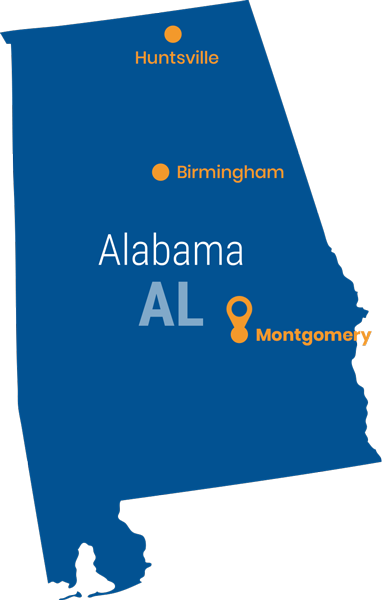What is Accounting?
Pursuing a career in accounting has always been a smart decision for enthusiastic, analytically minded people. And with the recent shakeups in the economy, the demand is greater than ever for accounting firms - each with a wealth of career positions that are accounting-adjacent - to hire qualified Alabama state accounting program graduates.
One of the most visible benefits available for accounting students is the variety of careers out there; it’s not just CPA positions. The specializations in accountancy are numerous and can range from human resource workers, budget analysts, and risk management positions all the way to cost estimators and personal financial advisors.
However, if you’re interested in joining the workforce as an accountant, there’s no need to go all-in on one specialization from the beginning. It’s essential to keep a wide-angle view of the opportunities that are out there for accountants of all stripes.
While it’s generally a good idea for potential accounting students not to limit themselves into a specialization prematurely, there are some state-to-state details that one should keep in mind before enrolling in the program of your dreams.
Attending an accounting program in Alabama carries many benefits for Alabama residents. Living in the same state as you graduate means that your reputation precedes you in many cases, or at least the reputation of your school program. Any local networks that you developed while attending school will also carry weight with hiring managers who have personal knowledge of the instructors who teach in local programs.

Featured Online Programs
Best Schools for Accounting in Alabama
Auburn University
Score: 83.83
- Undergraduate Tuition
- In-State: $12,536
- Out-of-State:$33,944
- Net Price: $24,524
- Acceptance Rate: 50%
- Retention Rate: 93%
- Graduation Rate: 79%
- Total Enrollment: 33,015
- Undergrad Students: 26,874
- Graduate Students: 6,141
- Grads Salary: $76,000
- Student-to-faculty: 21:1
University of Alabama in Huntsville
Score: 81.62
- Undergraduate Tuition
- In-State: $11,770
- Out-of-State:$24,662
- Net Price: $19,847
- Acceptance Rate: 74%
- Retention Rate: 81%
- Graduation Rate: 62%
- Total Enrollment: 8,743
- Undergrad Students: 6,851
- Graduate Students: 1,892
- Grads Salary: $83,000
- Student-to-faculty: 17:1
Birmingham-Southern College
Score: 79.37
- Undergraduate Tuition
- In-State: $22,750
- Out-of-State:$22,750
- Net Price: $24,170
- Acceptance Rate: 52%
- Retention Rate: 63%
- Graduation Rate: 64%
- Total Enrollment: 731
- Undergrad Students: 713
- Graduate Students: 18
- Grads Salary: $79,000
- Student-to-faculty: 9:1
University of South Alabama
Score: 79.31
- Undergraduate Tuition
- In-State: $9,676
- Out-of-State:$18,652
- Net Price: $13,613
- Acceptance Rate: 65%
- Retention Rate: 76%
- Graduation Rate: 53%
- Total Enrollment: 13,768
- Undergrad Students: 8,914
- Graduate Students: 4,854
- Grads Salary: $76,000
- Student-to-faculty: 18:1
The University of Alabama
Score: 78.46
- Undergraduate Tuition
- In-State: $11,900
- Out-of-State:$33,200
- Net Price: $21,761
- Acceptance Rate: 76%
- Retention Rate: 86%
- Graduation Rate: 74%
- Total Enrollment: 39,622
- Undergrad Students: 33,435
- Graduate Students: 6,187
- Grads Salary: $71,000
- Student-to-faculty: 19:1
University of Alabama at Birmingham
Score: 76.13
- Undergraduate Tuition
- In-State: $8,832
- Out-of-State:$21,864
- Net Price: $17,413
- Acceptance Rate: 88%
- Retention Rate: 82%
- Graduation Rate: 63%
- Total Enrollment: 21,160
- Undergrad Students: 12,382
- Graduate Students: 8,778
- Grads Salary: $71,000
- Student-to-faculty: 18:1
University of North Alabama
Score: 74.75
- Undergraduate Tuition
- In-State: $11,990
- Out-of-State:$22,190
- Net Price: $10,441
- Acceptance Rate: 96%
- Retention Rate: 78%
- Graduation Rate: 54%
- Total Enrollment: 10,059
- Undergrad Students: 7,451
- Graduate Students: 2,608
- Grads Salary: $68,000
- Student-to-faculty: 18:1
University of Mobile
Score: 73.38
- Undergraduate Tuition
- In-State: $26,120
- Out-of-State:$26,120
- Net Price: $20,503
- Acceptance Rate: 73%
- Retention Rate: 72%
- Graduation Rate: 56%
- Total Enrollment: 1,911
- Undergrad Students: 1,688
- Graduate Students: 223
- Grads Salary: $71,000
- Student-to-faculty: 13:1
Samford University
Score: 72.72
- Undergraduate Tuition
- In-State: $38,144
- Out-of-State:$38,144
- Net Price: $32,176
- Acceptance Rate: 82%
- Retention Rate: 88%
- Graduation Rate: 80%
- Total Enrollment: 5,791
- Undergrad Students: 3,832
- Graduate Students: 1,959
- Grads Salary: $67,000
- Student-to-faculty: 14:1
Columbia Southern University
Score: 67.52
- Undergraduate Tuition
- In-State: $5,808
- Out-of-State:$5,808
- Net Price: $14,085
- Acceptance Rate: 100%
- Retention Rate: 59%
- Graduation Rate: 37%
- Total Enrollment: 18,487
- Undergrad Students: 13,111
- Graduate Students: 5,376
- Grads Salary: $77,000
- Student-to-faculty: 28:1
Alabama A&M University
Score: 67.09
- Undergraduate Tuition
- In-State: $10,024
- Out-of-State:$18,634
- Net Price: $14,064
- Acceptance Rate: 66%
- Retention Rate: 64%
- Graduation Rate: 29%
- Total Enrollment: 6,614
- Undergrad Students: 5,845
- Graduate Students: 769
- Grads Salary: $70,000
- Student-to-faculty: 19:1
Auburn University at Montgomery
Score: 65.2
- Undergraduate Tuition
- In-State: $9,436
- Out-of-State:$20,092
- Net Price: $15,458
- Acceptance Rate: 93%
- Retention Rate: 66%
- Graduation Rate: 36%
- Total Enrollment: 5,189
- Undergrad Students: 3,407
- Graduate Students: 1,782
- Grads Salary: $67,000
- Student-to-faculty: 15:1
Huntingdon College
Score: 64.46
- Undergraduate Tuition
- In-State: $28,650
- Out-of-State:$28,650
- Net Price: $22,642
- Acceptance Rate: 71%
- Retention Rate: 67%
- Graduation Rate: 47%
- Total Enrollment: 869
- Undergrad Students: 866
- Graduate Students: 3
- Grads Salary: $62,000
- Student-to-faculty: 14:1
Faulkner University
Score: 64.25
- Undergraduate Tuition
- In-State: $23,920
- Out-of-State:$23,920
- Net Price: $19,908
- Acceptance Rate: 66%
- Retention Rate: 70%
- Graduation Rate: 38%
- Total Enrollment: 2,933
- Undergrad Students: 1,793
- Graduate Students: 1,140
- Grads Salary: $62,000
- Student-to-faculty: 13:1
Alabama State University
Score: 63.36
- Undergraduate Tuition
- In-State: $11,248
- Out-of-State:$19,576
- Net Price: $13,504
- Acceptance Rate: 96%
- Retention Rate: 60%
- Graduation Rate: 30%
- Total Enrollment: 3,870
- Undergrad Students: 3,322
- Graduate Students: 548
- Grads Salary: $67,000
- Student-to-faculty: 16:1
University of West Alabama
Score: 63.06
- Undergraduate Tuition
- In-State: $10,990
- Out-of-State:$20,090
- Net Price: $14,781
- Acceptance Rate: 87%
- Retention Rate: 61%
- Graduation Rate: 38%
- Total Enrollment: 6,194
- Undergrad Students: 2,673
- Graduate Students: 3,521
- Grads Salary: $61,000
- Student-to-faculty: 17:1
Athens State University
Score: 62.88
- Undergraduate Tuition
- In-State: $7,530
- Out-of-State:$15,060
- Net Price: N/A
- Acceptance Rate: N/A
- Retention Rate: 78%
- Graduation Rate: 50%
- Total Enrollment: 2,955
- Undergrad Students: 2,531
- Graduate Students: 424
- Grads Salary: $72,000
- Student-to-faculty: 14:1
Herzing University-Birmingham
Score: 59.05
- Undergraduate Tuition
- In-State: $13,420
- Out-of-State:$13,420
- Net Price: $21,338
- Acceptance Rate: 94%
- Retention Rate: 50%
- Graduation Rate: 25%
- Total Enrollment: 448
- Undergrad Students: 446
- Graduate Students: 2
- Grads Salary: $72,000
- Student-to-faculty: 14:1
Miles College
Score: 54.05
- Undergraduate Tuition
- In-State: $12,714
- Out-of-State:$12,714
- Net Price: $14,633
- Acceptance Rate: 100%
- Retention Rate: 56%
- Graduation Rate: 26%
- Total Enrollment: 1,151
- Undergrad Students: 1,151
- Graduate Students: N/A
- Grads Salary: $52,000
- Student-to-faculty: 12:1
Chattahoochee Valley Community College
Score: 51.63
- Undergraduate Tuition
- In-State: $5,040
- Out-of-State:$8,850
- Net Price: $6,741
- Acceptance Rate: 100%
- Retention Rate: 55%
- Graduation Rate: 36%
- Total Enrollment: 1,712
- Undergrad Students: 1,712
- Graduate Students: N/A
- Grads Salary: $32,100
- Student-to-faculty: 15:1
Online Accounting Education in Alabama
Every state in the nation has its own set of standards and practices for granting students licensures they might earn after an accounting degree. The differences in accounting careers are reflected by local laws, demand, and the degree specializations that each school prides itself on.
There are dozens of concentrations and degree programs of all semester lengths, credit hour requirements, and other variables in the state of Alabama, but don’t let that scare you from investigating the pros and cons of each. The first step is to keep your career goals in mind and then look closely at what degree level suits your needs.
How far will each degree level (Associates, Bachelors, Masters/MBA, and Ph.D.) propel you into your profession? In most cases, investing more time in a program will bring a higher average salary and access to specializations that boast increased pay, but not in all cases.
Odds are you’ve got questions about the different accounting degrees. What is the lowest level that will grant a job? What degree do you need for a management position? Is an MBA the same as a master’s? Let’s look a little closer at the takeaways available for accounting students at each degree level.
Online Associates (AS)

Associate accounting degrees are two-year programs designed to combine general education classes with an introductory course for fledgling accountants. It’s an excellent starting point for many students interested in pursuing a career in accounting but who don’t have the financial resources to plunge headfirst into more demanding degree programs, or even for those who may have struggled in school and need to boost their GPA before applying to more demanding four-year programs.
There are many excellent positions hiring across the state - and these are growing in demand - for two-year accounting graduates. Entry-level jobs like bookkeepers, auditing clerks, and accounting clerks are always open for associate degree holders.
Many people wonder if those with associate degrees can become CPAs. Since Alabama requires graduates to complete 150 credit hours to apply as a prospective CPA, associate degree holders will have to enroll in further education to accomplish the minimum credit hours to earn this high-level certification. For context, four-year bachelor’s degrees typically last 120 hours. However, for those looking for certification at this level, you may want to look into bookkeeper certification.
Many accounting programs also furnish students with the credentials to transfer to a four-year program upon graduation, which is an added benefit for people who wish to further their education.
Online Bachelors (BS)

Bachelor’s students enrolled in an accredited accounting school in Alabama can count on their investment in a four-year program paying off. A BS degree in accounting will prepare graduates for business roles like accountants and auditors; positions expected to grow by 4% in the next decade. The Bureau of Labor Statistics lists accountants and auditors with a median annual wage of $71,550.
Can bachelor’s students sit for the CPA exam? The simple answer is yes. In Alabama, people don’t need a master’s to take the CPA exam. However, for bachelor’s degree holders to apply, they need 150 credit hours of education. In a four-year program, that means you’ll need to take extra credit or go for a double major. Or you could choose to take a few master’s-level classes and set yourself up to finish a master’s program in record time later in your career.
Bachelor’s programs are often less expensive than master’s programs, making them a good choice for people looking to pay their way to an MBA on their own terms. Plus, the more extended four-year period gives you more time to narrow down your career goals to a specialization that you genuinely love pursuing.
Finally, the job offerings available to bachelor's increases when compared to associates. Forensic accountants, financial analysts, personal financial advisors, and actuaries all often start off with bachelor’s degrees. The demand for these specialized jobs is very high.
Online Masters (MS)

Graduates from four-year bachelor’s programs often commit to the additional two-year accounting master’s programs. The primary reason is to win certification as a CPA or find a managerial career in finance or related fields. A master’s can get you into a management position quickly because of the depth of knowledge you will obtain.
However, it’s important to know that a Master of Business Administration (MBA) is not the same thing as a master’s in accounting, even if you choose a concentration in accounting to go with it. That’s a widespread misconception. There are many master’s programs in accounting that aren’t MBAs (Masters of Business Administration).
For instance, prospective master students can pursue:
- MS in Accounting (Masters of Science)
- MAcc (Masters of Accountancy)
- Masters of Professional Accountancy or Accounting
- Certified Public Bookkeeper
- Certified Management Accountant (CMA)
- Certified Internal Auditor
- Plus, many concentrations within each degree program
Most Alabama master’s accountancy programs will prepare students to sit for the CPA (certified public accountant) exam. Passing the exam opens students up to higher accounting management positions overall. If you’re looking for a management position, a master’s degree is typically required.
Online PhD (PhD)
For students whose career goals skew more towards research and teaching interests, there are doctorate degrees available. Many graduates from this highest level of accounting education pursue careers as professors, research positions in public policy, tax law, consultant positions in large firms, or analyst careers.
A PhD, or doctorate, isn’t required for CPA practice in Alabama, nor are the majority of upper-level managerial positions filled by those with this high-level degree. However, many interested in the mathematical or research-based side of accounting, as well as the academic, flourish in PhD programs.
Typically, PhD applicants take the GMAT or GRE then follow a specialized curriculum in accounting, microeconomics, and advanced mathematics for two years to qualify for the degree. Investing your time in a terminal degree like a PhD will often lead to a higher average salary outlook. According to the BLS, a financial manager with a PhD can earn as much as $129,890 yearly.
Get our Financial Aid Guide Learn more about accounting resources and scholarshipsCPA Exam Requirements in Alabama
Education is the longest part of the journey for a certified public accountant (CPA). Alabama has very specific educational requirements to satisfy before taking the exam and you should structure your college career according to those needs. Students beginning their career as an accountant with an associate degree in accounting (AA) will learn some core accounting terms, skills, and requirements, as well as gain an overview of essential functions that will be expanded upon in future education advancement. As you work towards your Alabama bachelor's degree with a major in accounting or economics, make sure you satisfy the following additional content requirements for every student:
- 9 credit hours of financial accounting courses
- 6 hours each of auditing and taxation
- 3 hours of management accounting
- 3 hours of government and non-profit accounting
- 6 hours of electives in accounting
- 27 graduate or undergraduate hours in Business courses such as marketing or management
Due to the policy that all CPA candidates in AL must have completed 150 semester hours, it's not a shock that most students view a master's degree as 100 percent necessary, and they find the info and skills they gain well worth their time. Taking additional accounting courses on top of those required for the major also helps them pass the CPA exam. If you are in an online MBA accounting program with the end-goal of becoming a CPA, make sure that you satisfy these requirements. Note that if your undergraduate work included a few, but not all, of these requirements, you can take graduate courses and complete your transcripts to satisfy the Board. You can always review your transcripts with an academic advisor for free while in school, or contact the Board through their website for help determining what requirements you still need to satisfy.
- Accreditation:
For your Alabama undergraduate degree, make sure that your college or university has been accredited by the Southern Association of Colleges and Universities, or a regional equivalent. If you are entering the accounting field from graduate school, your program should be accredited in either business or accounting by the AACSB. If the AACSB did not accredit your graduate program, an equivalent institute or group is acceptable. Please discuss any other accrediting body with the Alabama board prior to application for the CPA exam to make sure it is recognized and don't select any school that doesn't have accreditation. Unaccredited or under-accredited schools in Alabama have low quality faculty, technology, etc. and top accounting firms don't often hire graduates from these schools.
Taking the CPA Exam in Alabama
There are many CPA exam requirements. All future CPAs who are looking to sit for the CPA examination must formally apply by including a completed, signed, and notarized application with a 2” by 2” photograph attached, the necessary fees, and an official transcript from each institution of higher education from which applicable credits were earned.
All CPA exam candidates must pay both an application fee and an examination fee, and can sign up to take one, two, three, or four sections of the exam. Your Notice to Schedule is valid for six months after it is issued. The application fee is $120 and is required regardless of how many sections you take, and each section has an associated examination fee of $208.40.
- Passing the Exam:
The Board of Accountancy will mail test scores as soon as they are received. You may take the CPA exam sections in any order, once per each three-month window. If you do not obtain a passing score of at least 75, you are eligible to retake the exam section you did not pass within a rolling 18-month period. If you do not pass all sections within this 18-month period, any passing scores will be lost and the section must be retaken. - Test Availability:
Testing is not available in March, June, September or December, but may be taken at any time January-February, April-May, July-August, October-November. Be sure to mark your calendar and pace your preparation accordingly.
The Uniform CPA Examination is administered by Prometric, and may be taken at any licensed Prometric center after you have received a Notice to Schedule from the board.
You must bring two forms of government issued photo id and your Notice to Schedule to your test.
Continuing Professional Education Requirements
To maintain your Alabama state CPA licensure, you must continue learning and updating your knowledge of accounting. Alabama requires that CPAs complete a minimum of 40 hours of continuing education credit per year, every year, ending on September 30. At least eight of those hours must be in the field of accounting and auditing. The board limits behavioral coursework to eight hours. This sort of professional development can be invaluable. Not only do you satisfy the Board, but your continued development will be a boon to yoru accounting practice.
There are associations, such as the Alabama Society of CPAs (ASCPA) or the National Association of the State Boards of Accountancy (NASBA) who provide educational opportunities via in-person seminars, webinars, and self-study programs. Seminars are held at various conferences and stand-alone seminar sessions across the state year-around. You can also take courses through other associations or at a local college or university. You may even take courses online at universities in other parts of the nation.
If you decide to conduct independent study and writing, the Alabama board will recognize your time in completing published articles or books towards your CPE requirement. These materials must directly apply to the field of accounting and the board will determine how much credit is given. You can use published materials to count for up to one quarter of the total required CPE credits. Thus, any time you spend over 10 hours writing and researching a publication may not be counted.
Get Matched With Accounting Colleges
Become an Accountant in Alabama
One of the primary reasons why thousands of dedicated students decide to follow an education in accounting is the diverse number of jobs out there for graduates to find. But that leaves the tricky part out of the equation: how do you find the professional career that suits you? More importantly, what is needed to become an accounting professional.
As with most states, the first step to becoming an accountant in Alabama is education. As you saw in the previous sections, each degree level can provide you with more and more access to a variety of positions. A bachelor’s degree is the most common level of degree earned by those who wish to work as accountants or auditors within the accounting industry. However, the State of Alabama does not require that you have a bachelor’s degree to work as a general accountant. Your ability to work as an accountant is based on your ability to find a job in the field. So, if you are willing to work hard and start from the bottom, you may be able to move up into a staff accountant position without any post-secondary education. Of course, with the increase in educational offerings, those earning an accounting education, and necessary knowledge in accounting and information systems, it will likely become harder to work your way up into an accountant position without some sort of degree over the next 5-10 years. When it comes to becoming a CPA in Alabama, it’s a whole different story.
Become a CPA in Alabama
Alabama has many more requirements for those who wish to earn their CPA licensure than they do for those who wish to work in the accounting field in general. Where you may be hired to work as an accounts payable clerk or staff accountant with just an associate degree or a bachelor’s degree in another field, those who with to become a certified public accountant must meet a host of requirements. First, you must have a bachelor’s degree in accounting from an accredited college or university. You must have already completed 24 semester hours of accounting and 24 semester hours of business-related courses. And that’s just to take the CPA exam! Licensure will require another 9 hours of accounting courses and 3 hours of business courses be completed, either in finishing your degree or by taking extra graduate-level courses.
After you pass each of the four parts of the CPA exam, commonly considered to be one of the most difficult licensure exams in the U.S., then you can move on to the rest of the licensure requirements. This includes an entire year of work as an accountant, under the supervision of a CPA or public accountant with a valid Alabama permit to practice. If you don’t complete this work in a public accounting firm or as a staff accountant, you may need to work another full year to fulfill this requirement. This is for those working in industry, business, government, or college teaching. Once you have completed all these requirements, you can finally hold one of the most coveted certifications for accounting professionals in every state.
Potential Careers for Accounting Graduates
One thing that can make the process of choosing the best accounting degree program for you much more manageable and intuitive is to have clear career goals. There are dozens of specializations available to degree-holders in the accounting field - an upsell for graduates. But what specific role do you see yourself filling as an accomplished accountant? Let’s look at a few of the most popular careers.
- Financial Analyst:
Financial analysts work hand-in-hand with businesses to recommend ways to improve profitability and financial stability. As an advisor, they keep a close watch on markets to make the most accurate predictions on what’s going to change in specific industries or geographic regions. - Forensics:
Accountants in this field generally work close to law enforcement agencies like the FBI and IRS, but not exclusively. This career often investigates cases of “white-collar crime”: bribery, embezzlement, money laundering, and fraud. Careers in forensic accounting demand advanced degrees (master’s) and a special kind of person. If you are attracted to the idea of investigating financial crimes, blending law with finance, and prefer working in large firms or in the government, this career path may be for you. - Personal Financial Planning/Advising:
Becoming a financial planner is a highly sought-after career that requires a bachelor’s degree. Lots of people confuse financial planning with financial advising, but they are not synonymous. Financial planners work with people to personalize financial plans, choose investments, and tailor their client’s financial portfolios. It’s a one-on-one relationship with a client. Financial advisors require less education and direct people on smart investments. - Taxes:
Tax accountants work for their clients exclusively on the IRS tax codes, helping them avoid tax penalties while optimizing yearly tax returns. Accountants who follow this career field have to be meticulous with their analysis and know the US tax law like the back of their hand. Bachelor's degrees are required for many tax preparation careers, and professionals often add a master’s to specialize as a CPA or enrolled agent. One thing to keep in mind for people interested in this career is that tax accountants often work long hours during tax season. That means you can expect to work extended hours for three to four months of the year. - Estates and Trusts:
Estate and trust specialists are often CPAs or EAs (Enrolled Agents) who work within tax laws, making valuations on personal and business assets to secure their clients the optimal tax profile. This job demands accountants have a good “bedside manner” with their clients, meaning a personable, councilor-like empathy. Accountants interested in the intricacies of estate and gift tax, valuations of large business entities, and comfortable managing corporate finance, this high-risk, high-reward career path could suit you. - Real Estate Appraiser:
This position requires someone with keen observational skills as well as a familiarity with real estate practices. Appraisers determine the value of properties, working hand-in-hand with homeowners and tax preparers. Teamwork and knowledge of property law are essential. - CPA:
The CPA is a document-heavy profession, with accountants analyzing personal and corporate data and preparing tax returns that optimize their clients’ tax status. The ideal CPA is a people-person who enjoys collaborating with both the IRS and their clients. Public accounting also requires CPAs to file financial reports to the SEC. - Accounts Payable/Accounts Receivable Specialist:
Payroll accounting (another title for this specialty) is a position that plays a variety of roles in the company. These professionals look over payments to employees and ensure that the company is adequately compensating them. Some payroll accountants work for various businesses simultaneously, which suggests that multitasking is a good skill to have. - Budget Analyst:
Budget analysts look over their company’s books to ensure money is spent and managed correctly. They reduce risks by monitoring if funds are going to the right projects and, if funds are being misused, they make reports to managers about inappropriate spending. This position requires someone with a strong sense of right and wrong. - Bookkeeper:
Bookkeepers have to be well-organized recordkeepers for their organization. They record, monitor, and manage financial transactions, likely quite a lot of transactions, to ensure companies operate above board. - Accounting Manager/Controller:
Bluntly put, accounting managers keep an eye on a company’s accountants, ensuring that the group is working efficiently as a whole, and recommending policy changes that improve the business. This position demands an advanced degree and a “macro” view over groups of people.
Learn more about all accounting careers
Potential Additional Careers
The short summaries above are only the first step towards introducing you to the variety of professional careers waiting for accountant degree-holders.
Some other positions include:
- Compliance Officers
- Tax Attorneys
- Actuaries
- Tax Consultants
- Tax Preparer
- Forensic Accountant
- Financial Planner
- Internal Auditor
Hopefully, with the information included here, there are enough details to help persuade prospective accountants to investigate which degree program is right for them. Almost every Alabama program offers an excellent education for accountants to get started on a career of their dreams. All that’s left to decide is where to go and you can utilize University HQ's best universities to learn about some of the best ranked colleges in the U.S.
Search All Programs





















